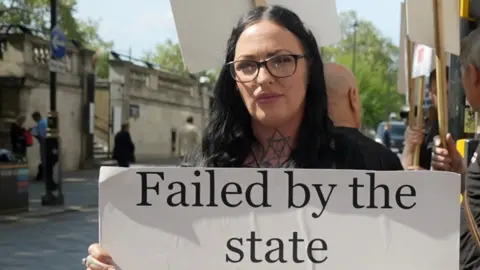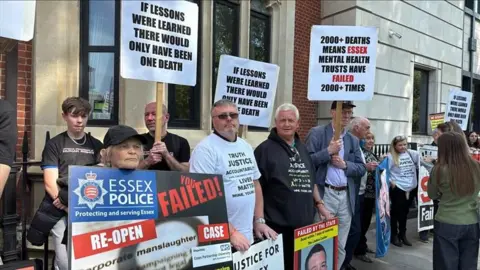Lampard Inquiry told of 'ongoing serious issues'
 Jamie Niblock/BBC
Jamie Niblock/BBCA public inquiry looking at deaths in mental health inpatient units over a four-year period, has highlighted continuing failures.
The first key evidence sessions in the Lampard Inquiry - examining more than 2,000 deaths at NHS inpatient units in Essex between 2000 and 2023 - have begun in London.
Counsel to the inquiry, Nicholas Griffin KC, said he was sad to be made aware of a death as recently as 22 April.
He added that retaining reports written by the coroner, that have the aim of preventing further deaths, "did not appear to have been a priority for some providers".
"It's clear that serious issues with mental healthcare in Essex continue, which underlines the significance and urgency of the work of the inquiry," Mr Griffin said.
 LAMPARD INQUIRY
LAMPARD INQUIRYMr Griffin said the inquiry had so far received only some of the information it would expect about inquests carried out during the relevant period.
He told the inquiry that in 2023, 37,000 inquests were opened across England and Wales and 492 of those occurred in state detention, which included people in mental health hospitals and on formal leave.
But he said that record keeping was an ongoing theme and they had difficulty locating all of the prevention of future death reports.
"It may be significant that logging and retaining reports that were written and issued with sole purpose of preventing future deaths (PFD's) does not at the moment, appear to have been a priority for some providers.
"The inquiry is concerned not enough was being done to monitor PFD reports."
A similar concern was recently raised at the neighbouring Norfolk and Suffolk NHS Foundation Trust (NSFT).
Mr Griffin said that only last month, the area coroner for Essex issued a prevention of future deaths report to Essex Partnership University Trust, regarding a tragic death at the end of 2023, that was of "considerable relevance to the inquiry".
He said that there were multiple failures in the care, management and treatment of the patient that amounted to neglect.
He then referred to a second death in the same year which found neglect, and further deaths in 2024 and in 2025 raising "similar issues".
Mr Griffin said although more recent deaths were outside the scope of the inquiry, they were relevant, as they may point to "serious and ongoing issues" and the inquiry would "carefully monitor" them.
 Jamie Niblock/BBC
Jamie Niblock/BBCThe inquiry also heard how future hearings would look at the multiple number of care regulators and whether it meant some cases were falling through the gaps as a result.
Mr Griffin said that the General Medical Council (GMC), which regulated doctors, had received 29 complaints regarding staff in Essex since 2006, none of which had resulted in any action.
Since 2008, the Nursing and Midwifery Council identified 149 referrals concerning 133 nurses. Four had been struck off, four cautioned, and 13 were suspended.
Mr Griffin said it highlighted the high threshold for taking action against staff and that these regulatory bodies were not the appropriate organisations to deal with systemic issues.
What is the Lampard Inquiry?
Mr Griffin said although the inquiry would focus on inpatient units provided by EPUT and Northeast London NHS Trust (NELFT), it would also include Hertfordshire Partnership University NHS Foundation Trust (HPFT) which ran Lexdon Hospital in Colchester.
He said the inquiry team had analysed the number of inpatient facilities in Essex, and that that number had reduced from 27 in 2009 to 16 a decade later.
Independent expert, consultant psychiatrist Dr Ian Davidson, told the inquiry the reduction was combined with a significant increase in the numbers needing help after 2023.
EPUT chief executive Paul Scott has apologised for deaths under his trust's care.
Inquiry evidence will continue in April and May.
Final recommendations are expected to be published in 2027.
Follow Essex news on BBC Sounds, Facebook, Instagram and X.
